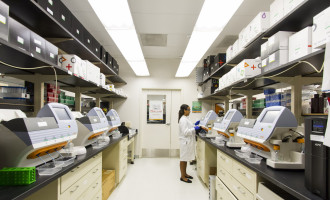
Data from the first clinical study using CRISPR gene editing technology to substitute a gene in patients’ immune cells to treat cancer has now been released. Results from the study, which was conducted with collaborators at nine academic centres, demonstrated early proof-of-concept that a patient’s immune system can be reprogrammed to recognise their own cancer.
The study findings were the focus of a late-breaking oral presentation at the 37th Annual Meeting of the Society for Immunotherapy of Cancer (SITC 2022), as well as a peer-reviewed paper in Nature that was published in conjunction with SITC 2022.
Every patient’s immune system contains T cells that can utilise specific receptors to find and kill cancer cells.
Unfortunately, patients often do not have enough of these T cells to mount a complete and effective attack on their cancer. PACT has developed proprietary technology platforms capable of creating engineered tumor-specific TCR-T cell therapies for this unmet treatment need.
This is accomplished by isolating TCRs directly from the blood of with the potential to address patients and then using CRISPR gene editing to engineer those isolated TCRs back into the patients’ own T cells. Once infused back into the patient, these engineered T cells redirect the patients’ immune system to recognise the patient’s own cancer.
As part of the oral presentation at SITC, researchers reported findings from a Phase 1 study in which 16 patients with solid tumours including colon, breast and lung cancer, were treated with their redirected T cells targeting mutations related to each patient’s cancer and up to three TCRs were selected for each patient as a basis for their individual therapy.
The selected TCRs were CRISPR engineered to replace the existing TCR with a cancer-specific one. These T cells were expanded to large numbers and then, up to three TCR cell products were infused back into each patient following a course of conditioning chemotherapy. isolate T cells The study involved researchers using patients’ blood samples to directly These T cells were then sequenced, leading to the identification of 175 unique, cancer-specific TCRs
The gene-edited T cells were preferentially trafficked to the tumour and could be recovered from post-infusion biopsies in all patients where biopsies were available. Of note, the CRISPR-edited T cells frequently represented the top 2-20% of immune cells in the tumour and led to tumour size reduction in some lesions of a patient with lung cancer.
Patients showed expected side effects caused by conditioning chemotherapy and two patients had potential side effects from the gene-edited cells, one with fevers and chills and the other with confusion, both recovering promptly. The study findings demonstrated the PACT therapy to be well tolerated while showing encouraging initial signs of clinical activity.
“This study represents a significant leap forward in efforts to develop a personalised treatment for cancer that utilises isolated immune receptors that can specifically recognise mutations within a patient’s own cancer,” said Antoni Ribas, M.D., Ph.D., professor of medicine and surgery at the University of California, Los Angeles, and a corresponding author of the Nature paper.
“This important research was only made possible with several next-generation technology platforms developed by the PACT team. Particularly critical to this effort was the newly developed ability to use CRISPR to replace immune receptors in clinical-grade cell preparations in a single step.
The work highlighted at SITC and within the Nature paper paves the way for the continued advancement of research aimed at delivering safe and effective, patient specific TCR T cell therapies for the treatment of cancer.”
This groundbreaking clinical study offers early proof-of-concept for several cutting-edge steps of the PACT approach to reprogramming a patient’s immune system to recognise and defeat their cancer, including:
“We are thrilled to share the findings from this first-in-human clinical trial which met its primary endpoints, demonstrating both the tolerability and feasibility of TCR discovery and manufacturing of a multi-TCR product using complete non-viral gene editing and safety of the infusion of a three TCR product,” said Stefanie Mandl, Ph.D., chief scientific officer, PACT Pharma.
“We look forward to continuing our research and development efforts in this area as we work to make personalised TCR T cell therapies a reality for all cancer patients. A key element to achieving this goal of broad applicability is our proprietary catalogue of 64 human leukocyte antigens (HLAs), which cover patients of all ethnicities. This is a key differentiator from most current TCR T cell therapies that are limited to only a single HLA molecule that is common in Caucasians.”
It is important to note that previous CRISPR-related clinical trials have involved deleting (knocking-out) specific genes to drive immune system activation against cancer or, more recently, inserting (knocking-in) an artificial receptor to guide cancer cell recognition.
However, these studies have not combined knocking-out endogenous genes and replacing them with the insertion (knocking-in) of substitute genes isolated from the same patient. In that regard, this PACT clinical trial represents a first-of-its-kind scientific breakthrough.
Source: PACT Pharma, Inc.
The World Cancer Declaration recognises that to make major reductions in premature deaths, innovative education and training opportunities for healthcare workers in all disciplines of cancer control need to improve significantly.
ecancer plays a critical part in improving access to education for medical professionals.
Every day we help doctors, nurses, patients and their advocates to further their knowledge and improve the quality of care. Please make a donation to support our ongoing work.
Thank you for your support.